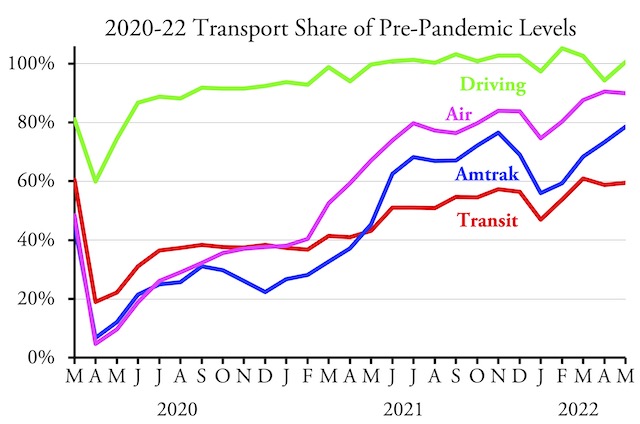Americans drove almost 288 billion miles in May 2022, compared with 286.4 billion in May 2019, according to data released yesterday by the Federal Highway Administration. This represents a 0.5 percent increase over pre-pandemic levels. Considering that regular gasoline prices were under $3 a gallon in May 2019 and around $4.50 a gallon in May 2022, this suggests that high fuel prices aren’t leading many Americans to abandon autos for transit or other modes.
While transit ridership appears to have plateaued at 60 percent of pre-pandemic levels, miles of driving have exceeded pre-pandemic numbers for most of the last year.
Transit advocates are increasingly promoting free transit for everyone, regardless of income, as a solution to transportation equity issues, when in fact transit practically irrelevant to 95 percent of American workers (including low-income workers) before COVID, and even more since. The real inequity is in low automobile ownership among low-income households, and that inequity can be reduced without giving everyone, regardless of income, free cars.









From the linked article … “The idea of free public transit has grown more popular in recent years and has spurred substantial debate. It has become popular in large part because it is simple, direct, and easy to understand.”
Just like there’s no such thing as a free lunch, there’s no such thing as free transit — taxpayers pay … and pay … and pay.
The US is 46th in life expectancy:
https://www.worldometers.info/demographics/life-expectancy/
but that doesn’t tell the whole story. If you look at miles traveled per year lived – a more accurate measure of the quality and freedom of mobility that makes life worth living – the United States is undoubtedly at the top.
46th in life expectancy…… thats because certain demographics buck the trend with high crime stats and gangbangers die early before 20.
Infant mortality is another issue they mock us for… but US laws define infant mortality differently.. in America if the born child exits the womb and takes an independent breath ITS ALIVE. If it dies… because sudden infant syndrome or post natal circumstance within a time frame of a month or year it counts.
In EU nations the baby should be a premie…even if it takes a breath..it still has to meet weight or size requirements to qualify as alive. That’s not only disturbing its how they mark off stats. Asian countries infanticide is ubiquitous….
LazyReader, interesting stories about gangbangers and babies, any evidence for them?
https://ourworldindata.org/us-life-expectancy-low
infant mortality statistics are also carefully biased. The US counts every live birth toward its statistics, however premature, even if the infant lives only a few hours. European countries may only count infants that live at least a day or which meet other health criteria. So, they claim fewer infant deaths, which dramatically changes the statistics for infant mortality and average life expectancy.
Critics claim that the US is spending too much compared to the numbers reported by foreign national health systems. I don’t believe that those systems are including all of their costs. Like high speed rail,, Government programs do not accurately report what they spend.
Good points Lazy Reader, and also infant mortality statistics should factor in mobility: infant deaths per millions of miles traveled. Another statistic where America is far superior to the rest of the world.
Jane, have you ever considered moving to Venezuela? Bernie says it’s nice.